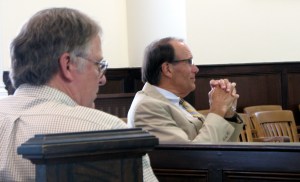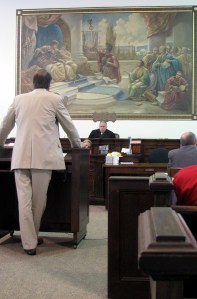PARIS — Attorneys for U.S. Cellular and the Town of Otisfield told an Oxford Superior Court justice Monday that a local group’s lawsuit against them should be dismissed.
“Our hope would be to put a period at the end of this and be done with it,” said attorney Richard Trafton, of Trafton & Matzen LLP in Auburn, who is representing U.S. Cellular. “We can’t provide (communication) services while in court.”
The Friends of Scribner Hill and individual plaintiffs James Gregory, Kristin Roy, Joseph Brown and John Poto are attempting to overturn the Board of Appeals’ March 20 denial of the group’s appeal of the Planning Board decision approving a permit to U.S. Cellular to construct a 180-foot-tall tower on Scribner Hill.
They have asked the justice to remand that decision back to the Planning Board for another full hearing — essentially starting the site plan review process again.
“My clients just want to be heard,” said the plaintiff’s attorney David A. Lourie of Cape Elizabeth.
The town of Otisfield, through its attorney Phil Saucier of the Portland firm of Bernstein Shur, said the town and U.S. Cellular would agree to have the case remanded back to the Planning Board for fact-finding development only. He said the town would then return to Superior Court and ask the judge to rule on the thoroughness of the process to prevent the plaintiffs from coming back with another lawsuit.
The plaintiff’s attorney told the court he wanted a full hearing to prevent the Planning Board from being “straight jacked.” A full hearing would allow the Planning Board to more broadly address the issue again, he said.
Lourie told Justice Robert Clifford the town did not follow its own communications tower ordinance and violated freedom of access laws by not properly notifying all “interested parties” individually about the Planning Board hearing. They also claim the Planning Board did not have a proper written decision.
The defendants, however, said the appeals board and Planning Board followed the town’s telecommunication ordinance properly and that the plaintiffs did not file their suit within the required time period. They further claim that not all the plaintiffs have legal standing in the case. For example, Trafton told Clifford the Friends of Scribner Hill, an unincorporated association, has no capacity to sue.
Clifford will decide who has legal standing in the case and whether the Board of Appeals’ decision to uphold the Planning Board’s January 17 approval should be remanded back to the Planning Board and if so, under what conditions. Clifford’s decision may be as long as several weeks in coming, said Trafton after Monday’s hearing.
On March 6, the appeals board heard testimony on an administrative appeal submitted by Poto, a Cobb Hill Road resident and former Planning Board member. Poto asserted that the Planning Board misinterpreted the town’s wireless telecommunications facility siting ordinance when it granted KJK Wireless, representing the permitting interests of U.S. Cellular, a permit on Jan. 17 for the tower.
In the decision, the appeals board made 23 individual “findings of fact.” They included statements relating to testimony given at the administrative appeals hearing and at previous public meetings.
The town has an ordinance that provides a process and set of standards for the construction of wireless telecommunications facilities. It is, in part, designed to protect the scenic and visual character of the community and ensure that the town can fairly and responsibly protect the public health, safety and welfare of residents. Under the ordinance, a site plan and scenic assessment are among the documents that must be submitted by the applicant.
The Planning Board’s Jan. 17 permit contained four conditions, including that the company submit a design for a fence at the bottom of the access road to prevent people from going up the hill to the tower base and that a bond be submitted that would allow the town to dismantle the structure if U.S. Cellular abandoned it.
The Planning Board also required that generator testing be done only Tuesday, Wednesday and Thursday between 8 a.m. and 5 p.m., and that the town’s public safety departments be allowed to utilize the tower.
Construction of the tower, which will accommodate space for other cellular companies and the Otisfield Fire Department’s communication equipment, was set to start in June and take five weeks to complete.




Comments are no longer available on this story